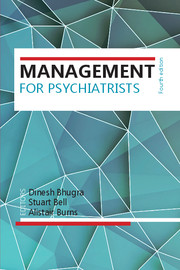Book contents
- Frontmatter
- Contents
- List of contributors
- List of figures, tables and boxes
- Preface
- Part I Theoretical overview
- Part II Changes and conflicts
- Part III Personal development
- 26 Compassionate care: leading and caring for staff of mental health services and the moral architecture of healthcare organisations
- 27 How to manage committees: running effective meetings
- 28 Presentation skills
- 29 Time management
- 30 Developing effective leaders in the National Health Service
- 31 Mental health informatics
- 32 Stress, burnout and engagement in mental health services
- 33 How to get the job you really want
- 34 Surviving as a junior consultant: hit the ground walking
- 35 Working with the media – many benefits but some risks
- 36 Consultant mentoring and mentoring consultants
- Index
27 - How to manage committees: running effective meetings
from Part III - Personal development
Published online by Cambridge University Press: 02 January 2018
- Frontmatter
- Contents
- List of contributors
- List of figures, tables and boxes
- Preface
- Part I Theoretical overview
- Part II Changes and conflicts
- Part III Personal development
- 26 Compassionate care: leading and caring for staff of mental health services and the moral architecture of healthcare organisations
- 27 How to manage committees: running effective meetings
- 28 Presentation skills
- 29 Time management
- 30 Developing effective leaders in the National Health Service
- 31 Mental health informatics
- 32 Stress, burnout and engagement in mental health services
- 33 How to get the job you really want
- 34 Surviving as a junior consultant: hit the ground walking
- 35 Working with the media – many benefits but some risks
- 36 Consultant mentoring and mentoring consultants
- Index
Summary
Forming, running and managing committees is all about getting things done: committees, like any other team of people who are pulled together, are there to achieve a set of objectives. Far too often, committees exist for historical reasons: they meet at set times because that is when they have always met, they rarely revise their membership for fear of offence and their agendas suffer from a lack of focus and direction. They can quite often be an unwelcome intrusion into the day-to-day working lives of healthcare professionals or impose extra commitments for people beyond the scope of their everyday jobs.
It stands to reason, therefore, that committees and meetings need to be set up for a specific purpose and have substantial relevance for the people attending. It is not acceptable for people to leave meetings wondering why they were there in the first place and we will look at the responsibilities that need to be embraced by organisers and participants alike.
Before and after
There are certain ground rules which can be applied to running meetings, be they part of a committee structure or otherwise. These should be useful guiding principles in any meeting environment. Applying the ground rules established at the start is paramount to effective meeting control.
Make it necessary
Consider the information around which the meeting is planned. Is it necessary to call a meeting? If the meeting involves a large amount of oneway information transfer, it may be more practical to use other means, such as email or letter.
Even if there is an element of discussion to be had, then a telephone call may be sufficient. Where the dialogue involves more than two people, a teleconference should be considered, as these can be time- and costeffective.
Set objectives for the meeting
If a meeting is seen to be the best way to meet the needs of the committee or group, it is important for that meeting to have a clear purpose and a structure. To help formulate this, complete the following statement: ‘By the end of the meeting I want the group to…’. Write down several phrases and use them as your objectives. Having an objective will also help you to evaluate the meeting afterwards. It is important to assess how successful the meeting has been.
- Type
- Chapter
- Information
- Management for Psychiatrists , pp. 403 - 413Publisher: Royal College of PsychiatristsPrint publication year: 2016



